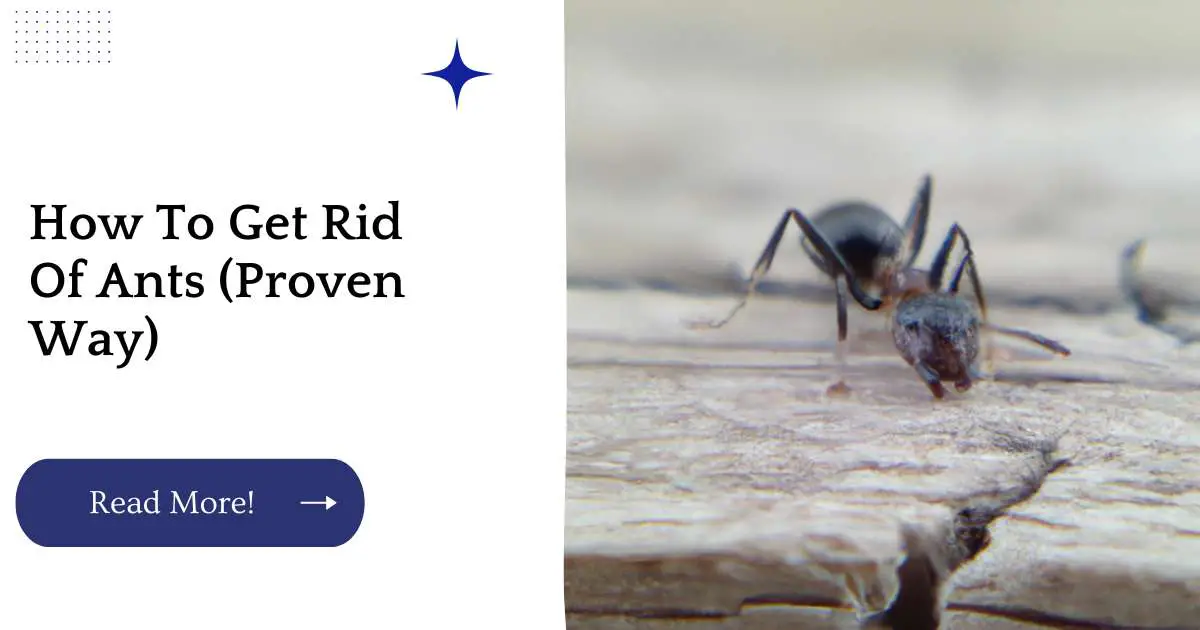You’re reading this because you’re tired of ants in your kitchen. Well, I have good news: I’ve got some solutions that will help keep those pesky critters away. First things first: You should always identify the type of ant before trying any treatment.
There are more than 12,000 species of ants worldwide, and each species has its own preferences when it comes to habitats and food sources. Here’s a short rundown of some common types:
| Key Takeaways |
|---|
| Boric acid is a natural and effective way to eradicate fire ants. |
| Identifying and eliminating ant food and water sources is the best way to prevent infestations. |
| Ant baits can be highly effective in controlling ant populations. |
| Different types of ants have different physical characteristics and behaviors that can help identify them. |
| Promptly addressing carpenter ant infestations is important to minimize the risk of structural damage. |
Orange Oil
Orange oil is a natural insecticide and can be used to kill ants. Orange oil works by suffocating the ants, so it’s important to get it down into their tunnels where they live and work.
Orange oil can be applied directly to the ants, but it’s also effective when sprayed along the foundation of your home or other places where you see them coming in or out. Orange oil comes in a spray bottle, making it convenient for applying it around your outdoor areas.
| Benefit |
|---|
| Effective against a wide range of pests, including termites and roaches. |
| Natural and non-toxic, making it safe for human and pet exposure. |
| Contains a natural repellent that helps keep pests away. |
| Has a pleasant scent that can freshen indoor spaces. |
| Can be used in a variety of applications, including as a pesticide, cleaner, and air freshener. |
Mint
Mint is a natural insect repellent and can be used to make a spray or oil. It has been proven to help keep ants out of your home, especially if you use it in the garden or on the countertop. Mint is safe for humans and pets, so it’s best to get rid of mints before they start growing in your house!
White Vinegar
Pour equal parts white vinegar and water into a shallow dish.
Place the food in the solution, then set it out on the ground where you think ants are coming in.
Let the concoction sit out for a few days (or even weeks), changing the food every day or so to keep it fresh and appetizing.
Once you’ve caught all of those little critters, clean up all of your messes—including any dead bodies from unfortunate encounters with this trap!
When it comes to fire ant infestations, Boric Acid is the best kept secret for eradicating these persistent pests. Check out our in-depth guide on The Secret to Eradicating Fire Ants: Boric Acid to see how it works and how to use it effectively.
Cinnamon
If you have a large ant problem, adding a few drops of cinnamon oil to a spray bottle can be effective at killing them. Spray the ants and the area where they are found, and the ants will die within 24 hours. The smell will dissipate in about a week.
Baking Soda And Powdered Sugar
You can kill ants with a mixture of baking soda and powdered sugar. Just mix one cup baking soda with half a cup of powdered sugar, and sprinkle it around your house. The ants will eat the mixture, which will kill them within several hours.
Be sure to keep pets and children away from this combination; they may mistake it for food or get confused by the sudden change in texture (baking soda is usually white, whereas sugar is usually brown).
Looking to rid your yard of fire ants? Look no further than boric acid. Read our article on 15 Tips for Effectively Using Boric Acid to Get Rid of Fire Ants to discover how to use this natural remedy to take care of your ant problem
Black Pepper
If you have black pepper in your pantry, this is a great repellent to have on hand. It’s not just for seasoning your food!
You can make a mixture of water and dish soap, then spray the trail of ants with it to keep them away. This solution also works well for other insects like cockroaches and spiders.
Cucumber Peelings
This is a classic home remedy for ants, and it even has scientific evidence to back it up! Cut your cucumber in half, sprinkle with salt (the more you use, the better), then place the halves outside near ant-infested areas.
The ants will eat the salt and water from the cucumbers, which dehydrates them—and they’ll move their new home to a dryer area.
Once they’ve left, dump out your peelings and start anew; this method should work for several days at a time before you have to change locations or methods again.
Tired of using harsh chemicals on your lawn? Boric Acid may be the natural solution you’ve been searching for. Learn what it is and how it works in our article on Boric Acid: The Natural Solution to Your Fire Ant Woes
Cayenne Pepper
You can also use cayenne pepper to kill ants. Cayenne pepper is a spice that’s made from hot peppers, and it’s very hot!
Sprinkle some around the area where you see ants and they’ll be gone in no time. Just make sure to use food-grade cayenne pepper, not the kind you’d get on your pizza or at a restaurant.
Also be careful not to touch your eyes or mouth after handling cayenne pepper because it will burn really badly!
Pringles Potato Chips Can (Really!)
If you have ants coming inside your house, this is a great trick to get rid of them. All you need is a Pringles can and some sugar water.
You’ll also want to turn the Pringles can on its side so that the ants will be able to go in easily and won’t be able to escape.
Pour some water into the Pringles can, then add a little bit of sugar (maybe 2 teaspoons). The ants will be attracted to the sugary water and climb up into it through tiny holes in the sides of the cylinder.
Once they’re inside, they won’t be able to climb back out because there are no more openings!
You don’t need much sugar at all; just enough so that when you shake up your trap with some more water added as needed every day or two over several weeks until all of its inhabitants have been removed
Ants in your sugar can be a real headache. Check out our helpful guide on How to Get Rid of Ants from Sugar: Few Tips to learn some easy tips on how to keep these pesky critters out of your pantry
Baby Powder
You can get rid of ants by sprinkling baby powder on the area where you see them. Leave the baby powder for a few days, then vacuum it up.
Baby powder is safe to use around pets and children.
Lemon Juice
If you’re trying to get rid of ants in your home, lemon juice may be the solution. Ants have a slightly acidic digestive system and are usually repelled by citric acid.
This is why lemon juice can kill ants so effectively. You can spray it directly on them or use it as a bait for traps, but be sure not to leave the liquid sitting around for long periods of time unless you want some seriously sticky floors!
Ants aren’t fond of concentrated vinegar either because it has an even higher acidity level than lemons do (5% versus 0.2%).
In fact, this is one reason why ants tend not to travel through areas where there are large amounts of vinegar lying around—they don’t want their exoskeletons dissolving!
Vinegar also works well when combined with borax powder (a natural substance that kills pests) because they both dehydrate insects and slow down their metabolisms if ingested in high enough concentrations over time (though they aren’t fatal).
Beer Trap
You can make a beer trap to get rid of ants.
First, cut a hole in the top of a beer can. Then fill up the can with beer and place it near an ant trail. The ants will go into the can for a drink, but won’t be able to get out again because they’ll drown in its contents.
Dealing with an ant infestation in the kitchen can quickly become a huge hassle. Fortunately, our guide on How to Get Rid of Ants in the Kitchen: Pro Tips is here to help. Give it a read to learn some professional tips on how to deal with these unwelcome guests in your kitchen
Conclusion
We hope that you learned a lot from this article. We know how frustrating ants can be, so we want to help as many people as we can get rid of them.
The best way to get rid of ants is by removing their food source and preventing them from coming back into your home again!
Further Reading
Here are some additional resources you may find helpful:
How to Get Rid of Ants Once and For All: In this comprehensive guide, you’ll learn how to identify different types of ants, determine the best treatment options, and prevent future infestations.
How to Kill Ants: A Guide to Maintaining Ant-Free Living Spaces: Keep your home ant-free with this guide from Healthline, which covers everything from identifying ant species to natural and chemical treatments.
Ant Control: How to Get Rid of Ants: This resource from Planet Natural provides a detailed overview of ant behavior, common types of ants, and strategies for controlling and preventing ant infestations.
FAQs
How do I prevent ants from entering my home?
The best way to prevent ants from entering your home is to eliminate their food and water sources. Be sure to store food in airtight containers, clean up spills and crumbs promptly, and fix any leaky pipes or faucets. Additionally, spray a barrier of insecticide around the perimeter of your home.
What are some natural ways to get rid of ants?
Some natural ways to get rid of ants include using citrus spray, vinegar, and cinnamon. You can also use boric acid or diatomaceous earth as a non-toxic, natural insecticide.
How do I know what type of ants I have?
Different types of ants have different physical characteristics and behaviors. AntWeb.org and AntWiki.org are two resources that can help you identify species based on their appearance, habitats, and distribution.
Are ant baits effective?
Ant baits can be highly effective in controlling ant infestations, as they allow ants to carry the bait back to their colony and feed it to other ants. However, it can take several days or even weeks to see results.
Can ants cause damage to my home?
Some species of ants, such as carpenter ants, can cause damage to wood structures in your home. If you suspect an infestation of carpenter ants, it’s important to address the problem promptly to minimize the risk of structural damage.

Hello! I’m Hellen James, and I write about how to keep pests from invading your home. For the last 10 years, I’ve been working in pest control and am excited to share my expertise with you!


